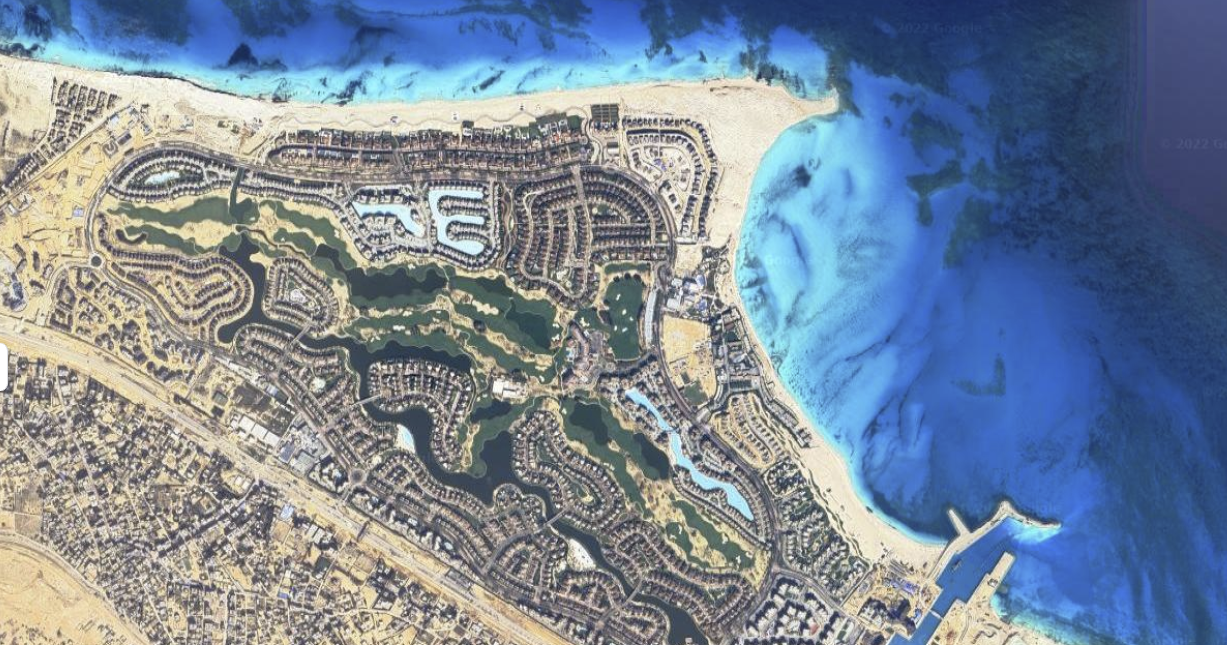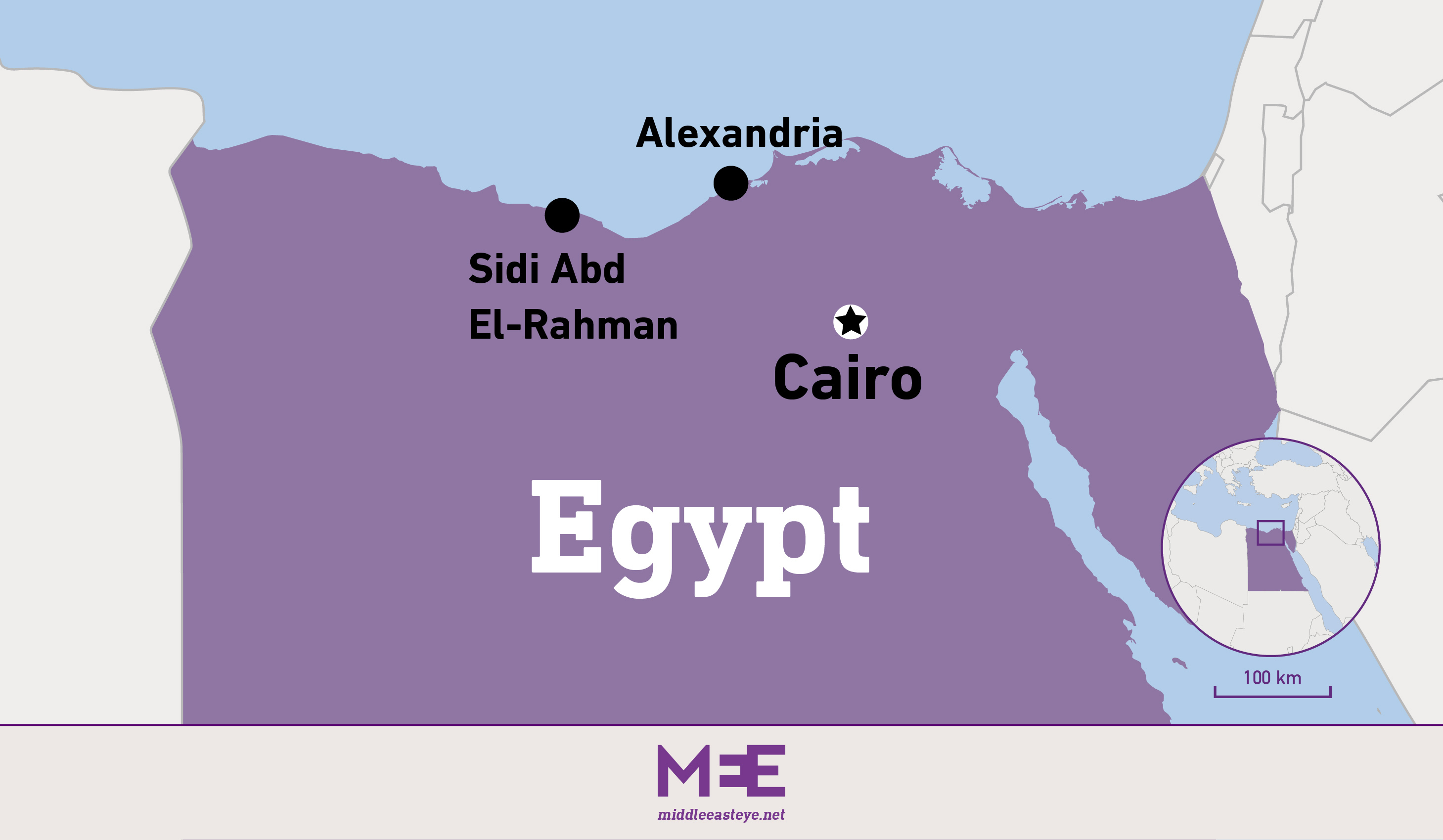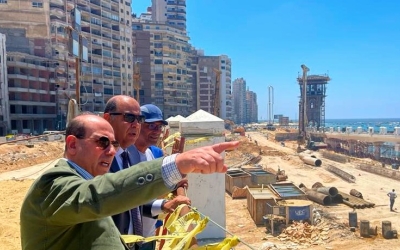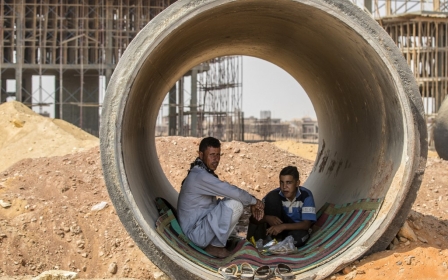UAE property company accused of causing irrevocable damage to Egypt's coast

An Emirati real estate company is facing a scandal in Egypt after its construction projects in a prime North Coast location caused potentially irrevocable damage to one of the country's most pristine beaches.
Engineers and urban planning experts have warned that Emaar, a United Arab Emirates-based multinational property firm, is embarking on developments that threaten the geological make-up of Sidi Abd el-Rahman, a village just over 130km west of Alexandria.
The affected area is part of a new multi-billion dollar summer capital, New Alamein, the construction of which was commissioned by the government of President Abdel Fattah el-Sisi.
Emaar has constructed its coastal resort Marassi over 6.5m square metres of land in Sidi Abd el-Rahman, with a mixture of 23 residential communities owned by some of the country's most affluent people.
'These activities are opening the door for the destruction of the North Coast'
- Elham Mahmud, professor of maritime sciences
It is also constructing another compound where properties are selling fast for over 100m Egyptian pounds (about $5m) each.
New MEE newsletter: Jerusalem Dispatch
Sign up to get the latest insights and analysis on Israel-Palestine, alongside Turkey Unpacked and other MEE newsletters
Emaar started delivering some of the villas, apartments and chalets at the Marassi resort in 2010.
The latest controversy started a few months ago, when Emaar embarked on a project to build a yacht marina in Marassi.
Major digging operations and the removal of huge amounts of sand from the beach meant the construction of the marina had disastrous environmental consequences, including changing the movement of waves along the shore and accelerating coastal erosion.
Not only has the dredging by Emaar significantly eaten away the beach in Marassi, but it has also put buildings nearby under direct threat from the waves.
The issue is not limited to Marassi, however.
Emaar's project has also raised the real possibility of a total erosion of Egypt's Mediterranean coast, amid warnings by environmentalists that investment activities are accelerating the threat posed by climate change to the area.
"These activities are opening the door for the destruction of the North Coast," Elham Mahmud, a professor of environment and maritime sciences at Suez University in eastern Egypt, told Middle East Eye.
"The construction of residential compounds in the coastal area is doing away with the sand dunes whose job it is to protect the coast."
In response to popular uproar, the Egyptian environment ministry on 24 July said it had suspended all dredging activities along Marassi's shoreline and formed a panel to consider the reasons for the erosion of the coast and the actions that should be taken to protect it.
A senior executive at Emaar did not return MEE's calls for comment on accusations that the company is destroying the Egyptian North Coast.
Embarassment ahead of COP27
The erosion scandal comes at a sensitive time for Egypt as it prepares to host the United Nations climate change conference, COP27, in Sharm el-Sheikh in November.
Egypt is making momentous preparations for the conference, including turning Sharm el-Sheikh into a "green" city.
Cairo hopes to use the conference to focus the international community's attention on the importance of offering necessary financial support to African countries so that they can adapt and manage the effects of climate change.
It also wants to showcase its own past and current efforts to deal with climate change.
Nonetheless, coastal erosion in the north puts the government on the spot as it emphasises the difficulty of walking the line between pleasing investors and protecting the environment.
"Some of the investments on the North Coast pose dangers to the environment, like in the case of Emaar," Ali Nour, a member of the environment committee in the House of Representatives, the lower chamber of parliament, told MEE.
"I'm sorry to say this problem is not limited to the North Coast alone."
Some have already accused the government of failing to check Emaar's destructive activities along the coastline, including a pro-government TV host who lashed out at authorities for the lack of supervision of the Emirati company's work.
A number of Egyptian public figures have already called on the government to take decisive action against Emaar.
"Like we ask the government to create an environment favourable for investments, we ask it to defend its dignity by taking deterrent action against foreign investors who do not abide by the law," former minister of industry Mounir Fakhri Abdelnour wrote on Twitter last week.
Coastal erosion was already a sensitive issue in Egypt long before the recent developments, so the news of the sea biting into the Mediterranean coast has alarmed Egyptians who already feared the worst, from the nation's environmental experts to the media and the parliament.
The Cairo government has already taken some action to protect its coasts from erosion.
Several years ago it launched projects worth hundreds of millions of dollars, including some in cooperation with the United Nations, to counter the impact of climate change.
The government is also constructing dams in some of Egypt's coastal cities and an early warning system to monitor the movement of waves and rains, among other measures.
Desperate for investment
Almost a decade ago, local and international real estate developers, and tourism investment companies, started redirecting their investment from Egypt's Red Sea resorts of Sharm el-Sheikh and Hurghada, which have become saturated markets, towards the Mediterranean coast.
The North Coast, commonly known as El-Sahel, is an area stretching hundreds of kilometres along the Mediterranean Sea to the left of the Nile Delta, between the northern port city of Alexandria and Egypt's border with Libya in the west.
It is home to some of the Mediterranean's most beautiful, tourist-friendly beaches.
The coast has captivated visitors and nature lovers for decades thanks to its pristine waters, soft white sands and unspoiled natural environment. Remarkably, the area has still - so far - managed to avoid the overcrowding suffered by cheaper summer destinations such as Alexandria.
Dozens of lush residential and tourist compounds have sprouted up in the area. They have extravagant names that capitalise on their distinct surroundings and distance from densely populated areas around the capital, Cairo, and Alexandria, Egypt's oldest resort city.
The compounds have drawn in Egypt's most wealthy, with villas, flats, and chalets selling for tens of millions of Egyptian pounds.
Some of the new projects are part of the government's drive to attract investment as it works to shore up its economy, which has been badly damaged by the Covid-19 pandemic and the war in Ukraine. There is also a desperate need to create good jobs for the hundreds of thousands of young people who graduate from its universities every year.
To charm investors, the authorities have revolutionised investment regulations, offering incentives that include tax exemptions and plots of land across the nation.
They have also eased the licensing of investment projects, creating a one-stop shop for investors where they can rapidly finalise investment procedures.
Like the private sector, the government has also figured out the investment potential of Egypt's North Coast and has started building a new city in an area that was once the site of a major World War II battle.
The New Alamein city, which is being constructed only a few kilometres away from the site of the 1942 Battle of El Alamein between British and German forces, is slated to include skyscrapers, residential areas, entertainment areas, a business district, a cultural centre, and agricultural facilities.
However, experts believe that coastal erosion has put in peril the tens of billions of Egyptian pounds that the government has invested in the new city and the huge investments by the private sector in projects along the coast.
"The erosion of the coast is a direct threat to all the projects in the area, opening the door for untold economic losses," Hossam Muharam, a former adviser to the minister of the environment, told MEE.
"The government is badly in need of taking measures to protect the coast."
This article is available in French on Middle East Eye French edition.
Middle East Eye delivers independent and unrivalled coverage and analysis of the Middle East, North Africa and beyond. To learn more about republishing this content and the associated fees, please fill out this form. More about MEE can be found here.







